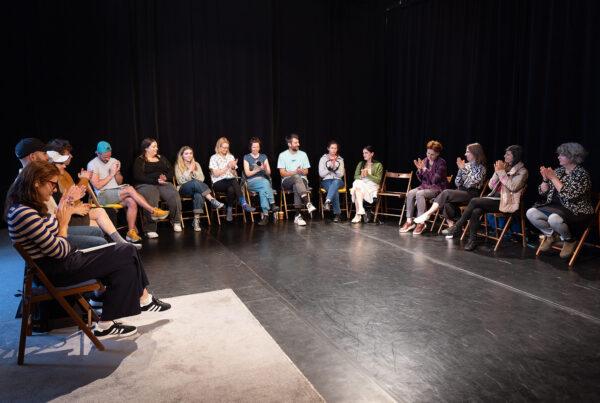Keynote “Opening Ears” by Johannes Gaudet (National Theater Mannheim)
May 26, 2017, Baxter Theatre Centre Cape Town / South Africa
Opening ears – that is, how one could describe one of the central concerns of our current work in musical theatre for young audiences in Germany and Europe. We try to open ears for old music and new sounds, for our environment and for noises, and – particularly – for silence: because it is out of the silence that sounds or tones can develop. We can describe hearing also as a sense of immediacy, because we don`t just listen with our ears, but also with our whole body. And we often don`t realize that our whole physical perception will change while we are listening. Through increasing automatization in our society physical experiences are decreasing, but conscious listening can be one of the activities that allows us to witness reality more directly again.
Frequently we find ourselves relentlessly exposed to the artificial noises of the world around us. Designers create sounds for coffee machines, cars, computers, mobile phones and trams and much more. In public spaces, background music is used almost exclusively as an emotional lubricant. Music and noises are intentionally used, for example: to increase our sense of well-being, to stimulate our desire to consume and – not the least – to cover up supposedly awkward silences. Background music is functional music that is supposed to animate or to appease the listener. That is why so-called elevator music is defined as follows: It`s music that`s heard but not listened to. You can learn a lot about the status of a society by looking at their acoustic habits.
The ear is an organ that operates unconsciously. With the help of sound concepts and background music the decision- makers purposefully employ a medium, to manipulate the consumer subconsciously.
The idea that music has a great influence on our souls is not new and was already known to philosophers in ancient times. The doctrine of affect as it is known to us from baroque music attempted to describe how sadness, happiness or fear can be expressed by sounds. In the nineteen-twenties it was explores how monotonous music should help the workers to work more effectively and productively. In times of wars, music is used to evoke a sense of belonging, to march in step, to develop a collective identity and to mobilize soldiers. Since the middle of the 20th century music has been degraded to a vehicle for consumption for the music-industry and has lost its role as a vehicle for aesthetic experiences.
As such, background music can be considered as the opposite of music as art. The purpose of music as art lies within itself. It demands our whole attention, it touches us deeply in our soul, in our core, music as art wants to tell us something.
The use of music as a consumer commodity has contributed to the fact that attentive and conscious listening to music gets lost. We has lost our skills to explore complex structures and are at the mercy of the every-day sound exposure..
Moreover, we are more and more affected by acoustic stress. Everywhere in the public space, in bars, in shopping centers, in cafe`s, in trams we are confronted with music or sounds from mobile phones or tablets that are delivered to us in bad sound quality. We know that people, who have problems with hearing, that it is extremely difficult for them to follow conversations when there is a high level of background sounds and noises. In such situations we exclude such people and deprive them of their fundamental right of communication.
Yes, as humans we have the capacity to tune out background noises and only tune back in when something unexpected takes place, .In fact, this is an important evolutionary survival skill. But not to listen does not mean that the constant exposure does not affect us subconsciously.,
Furthermore, there is the constant confrontation of working people with so-called silent noise. In many work-places people have to listen to subliminal noises of very high frequencies from refrigerators, air conditioners or cash tills. Phylogenetically, high frequency means danger, because of fire or flames. As a consequence our cardiac circulation increases and our body prepares itself to flee. Studies have found out that this stress has a serious effect on our health.
The acoustic space in our modern societies is more and more exploited and occupied by economy. And there has never been and there has never been a debate about who this space belongs to. Imagine, what would happen if such an occupation of our personal sphere took place in a physical way, like beating! This brings us back to the recurring question: Do we control the market or does the marked control us? dominate the technique or does the technique dominates us. Do we control what we listen to or are we controlled by what we are hearing. The public acoustic space requires regulations and principles of behavior that should be based on democratic decisions. So the question about the acoustic space is a question of power and, thus, highly political.
All of these are reasons for devoting more time and resources on training ourselves and our children in active and conscious listening, in order to become self-controlled and critical participants and agents of our own acoustic landscapes.
Nothing sounds as it sounds. But everything sounds as you make it sound. Important is not that you hear, but what you are listening to and how you are listening to it.
As such, I hope that the following exercises will give all of us:
Happy new ears
The keynote was part of a workshop on music theatre for young audiences held by ASSITEJ Germany and led by Meike Fechner, Johannes Gaudet and Angela Merl at the ASSITEJ World Congress in Cape Town on May 26th 2017. The workshop was funded by the Federal Department of Family, Senior Citizens, Women and Youth.







One Comment